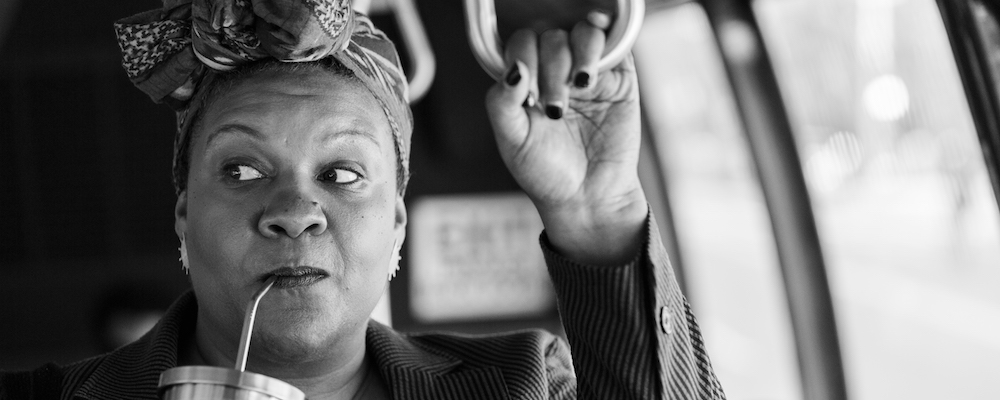In ‘The Forty-Year-Old Version,’ Radha Blank Looks to Her Second Act
Sandra Miska
Turning 40 is a major milestone, and while it is certainly a cause for celebration, for many, it is also a time to reflect on one’s life and accomplishments. Writer-director-actor Radha Blank takes a closer look at this season of life in her semi-autobiographical feature “The Forty-Year-Old Version.” Blank plays a fictionalized version of herself, a New York woman who rediscovers a talent for rapping during a bleak period in her once-promising career as a playwright.
Once a darling in the theater community who made a “30 Under 30” list, Radha, just mere months from the big 4-0, now teaches theater to teens in Harlem, the neighborhood she has lived in her whole life. She has been in a slump since the death of her mother, a struggling visual artist, a year prior. She’s anxious to get her next project, “Harlem Ave,” a play about Black business owners and gentrification, off the ground. So far, the only interest she has received is from a smaller theater. However, when she asks the owner (Jacob Ming-Trent) to be paid enough to make her rent, he spouts out some spiritual guff.
Meanwhile, Radha’s agent, Archie (Peter Y. Kim), pushes her to suck up to J. Whitman (Reed Birney), an obnoxious hot shot theater producer. An older white man, he’s only interested in “poverty porn,” according to Radha, and after a few minutes of listening to him critique “Harlem Ave,” basically stating that the characters have to suffer if they’re Black, we’re with her when she wraps her hands around his neck. Blank does a great job of satirizing the elite in the NYC theater world, wealthy white seniors whose idea of innovation is multiracial and/or gender-swapped productions of classic plays that have been produced again and again.
Radha’s relationship with Archie, a gay Korean-American man, is pretty interesting, some would even say co-dependent. Close since high school, they even briefly dated before he came out of the closet. Although Archie is Radha’s greatest ally, he’s also a businessman, and he puts his dignity on the line in order to get his client back into Whitman’s good graces. Ultimately, Radha and Archie clash over the idea of her “selling out,” which he doesn’t feel that she is above. While Radha’s journey here is unique in many ways, any artist can relate to her internal conflict. Eventually, she agrees to work with Whitman, and the viewer really feels for her as she struggles to accept his lame notes with grace.
It is during a subway ride that Radha is inspired to rap about her surroundings, something she did in high school. Although she is talented, she’s not exactly most people’s idea of cool, as even the homeless guy who lives by her building regularly roasts her. Determined, she visits D (Oswin Benjamin), a hip producer she finds on Instagram. Surprisingly, this chill 25-year-old who takes bags of weed as payment turns out to be her artistic soulmate, and the pair form a stronger connection outside of the studio, and it’s amusing to watch as they push each other out of their respective comfort zones.
Blank also does a commendable job of exploring the concept of legacy, and the idea that even those artists who die broke and unknown leave something behind. For Radha’s mother, it was her children. While Radha is still years away from being finished, we see her take the time to nurture her students, no matter how annoying some of them can be.
Shot in black-and-white with occasional pops of color, “The Forty-Year-Old Version” pays tribute to the works of Spike Lee, particularly “She’s Gotta Have It” (Blank wrote and produced for the Netflix television adaptation of the film). Camera-facing testimonials from the colorful characters in Radha’s neighborhood inject much zest into the film, particularly a sassy older Black woman who disapproves of Radha’s foray into rapping, stating there’s no need for a performer like her when we have a Michelle Obama. However, through this story of her fictional counterpart, Blank proves that one does not have to sacrifice one’s integrity in order to create something authentic.
“The Forty-Year-Old Version” releases Oct. 2 in select theaters and begins streaming Oct. 9 on Netflix.

